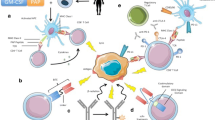Abstract
The components of an effective immune response have been elucidated in recent years. An understanding of the dysfunction of the immune response in cancer in one or more of these components has led to a variety of immunotherapeutic approaches. These therapeutic strategies are designed to stimulate dendritic cell proliferation, promote antigen uptake and processing, stimulate an effector cell response via direct antigen presentation, or target tumor cells via antibody therapy. Many approaches in prostate cancer have demonstrated successful induction of the desired immune response. Limited clinical success has also been seen.
Similar content being viewed by others
References and Recommended Reading
Gabrilovich DI, Chen HL, Girgis KR, et al.: Production of vascular endothelial growth factor by human tumors inhibits the functional maturation of dendritic cells. Nat Med 1996, 2:1096–1103.
Reese DM, Fratesi P, Corry M, et al.: A phase II trial of humanized anti-vascular endothelial growth factor antibody for the treatment of androgen-independent prostate cancer. Prostate J 2001, in press.
Gabrilovich DI, Ishida T, Nadaf S, et al.: Antibodies to vascular endothelial growth factor enhance the efficacy of cancer immunotherapy by improving endogenous dendritic cell function. Clin Cancer Res 1999, 5:2963–2970. This important preclinical study establishes the potential interaction of different immunotherapeutic approaches and establishes groundwork for future clinical trials.
Small EJ, Reese DM, Um B, et al.: Therapy of advanced prostate cancer with granulocyte macrophage colony-stimulating factor. Clin Cancer Res 1999, 5:1738–1744.
LeBlanc G, Small EJ, Bok RA, et al.: Granulocyte-macrophage colony-stimulating factor (GM-CSF) therapy for prostate cancer patients with serologic progression after definitive local therapy [abstract]. Proc ASCO 2001, 20:182a.
Nelson WG, Simons JW, Mikhak B, et al.: Cancer cells engineered to secrete granulocyte-macrophage colonystimulating factor using ex vivo gene transfer as vaccines for the treatment of genitourinary malignancies. Cancer Chemother Pharmacol 2000, 46suppl:S67-S72.
Simons JW, Mikhak B, Chang JF, et al.: Induction of immunity to prostate cancer antigens: results of a clinical trial of vaccination with irradiated autologous prostate tumor cells engineered to secrete granulocyte-macrophage colonystimulating factor using ex vivo gene transfer. Cancer Res 1999, 59:5160–5168. This and the previous trial [6] definitively show a tumor-specific immune response induced by the therapeutic intervention albeit with only modest clinical benefit.
Simons JW, Small EJ, Nelson W, et al.: Phase II trials of GM-CSF gene-transduced prostate cancer cell line vaccine (GVAX) demonstrate anti-tumor immunity [abstract]. Proc ASCO 2001, 20:269a.
Burch PA, Breen JK, Buckner JC, et al.: Priming tissue-specific cellular immunity in a phase I trial of autologous dendritic cells for prostate cancer. Clin Cancer Res 2000, 6:2175–2182.
Small EJ, Fratesi P, Reese DM, et al.: Immunotherapy of hormone-refractory prostate cancer with antigen-loaded dendritic cells. J Clin Oncol 2000, 18:3894–3903. This study establishes some clinical benefit to infusion of antigen-loaded dendritic and other immunologic cells.
Murphy G, Tjoa B, Ragde H, et al.: Phase I clinical trial: T-cell therapy for prostate cancer using autologous dendritic cells pulsed with HLA-A0201-specific peptides from prostatespecific membrane antigen. Prostate 1996, 29:371–380.
Tjoa BA, Simmons SJ, Elgamal A, et al.: Follow-up evaluation of a phase II prostate cancer vaccine trial. Prostate 1999, 40:125–129. This paper and the associated publication [13] establish PSMA vaccination as feasible and potentially clinically useful for the therapy of prostate cancer patients.
Simmons SJ, Tjoa BA, Rogers M, et al.: GM-CSF as a systemic adjuvant in a phase II prostate cancer vaccine trial. Prostate 1999, 39:291–297.
Mincheff M, Tchakarov S, Zoubak S, et al.: Naked DNA and adenoviral immunizations for immunotherapy of prostate cancer: a phase I/II clinical trial. Eur Urol 2000, 38:208–217.
Slovin SF, Ragupathi G, Adluri S, et al.: Carbohydrate vaccines in cancer: immunogenicity of a fully synthetic globo H hexasaccharide conjugate in man. Proc Natl Acad Sci U S A 1999, 96:5710–5715.
Sanda MG, Smith DC, Charles LG, et al.: Recombinant vaccinia-PSA (PROSTVAC) can induce a prostate-specific immune response in androgen-modulated human prostate cancer. Urology 1999, 53:260–266.
Eder JP, Kantoff PW, Roper K, et al.: A phase I trial of a recombinant vaccinia virus expressing prostate-specific antigen in advanced prostate cancer. Clin Cancer Res 2000, 6:1632–1638.
Hrouda D, Baban B, Dunsmuir WD, et al.: Immunotherapy of advanced prostate cancer: a phase I/II trial using Mycobacterium vaccae (SRL172). Br J Urol 1998, 82:568–573.
McDevitt MR, Barendswaard E, Ma D, et al.: An alpha-particle emitting antibody ([213Bi]J591) for radioimmunotherapy of prostate cancer. Cancer Res 2000, 60:6095–6100.
Deb N, Goris M, Trisler K, et al.: Treatment of hormonerefractory prostate cancer with 90Y-CYT-356 monoclonal antibody. Clin Cancer Res 1996, 2:1289–1297.
Meredith RF, Bueschen AJ, Khazaeli MB, et al.: Treatment of metastatic prostate carcinoma with radiolabeled antibody CC49. J Nucl Med 1994, 35:1017–1022.
Slovin SF, Scher HI, Divgi CR, et al.: Interferon-gamma and monoclonal antibody 131I-labeled CC49: outcomes in patients with androgen-independent prostate cancer. Clin Cancer Res 1998, 4:643–651.
Meredith RF, Khazaeli MB, Macey DJ, et al.: Phase II study of interferon-enhanced 131I-labeled high affinity CC49 monoclonal antibody therapy in patients with metastatic prostate cancer. Clin Cancer Res 1999, 5suppl:3254s-3258s.
Katzenwadel A, Schleer H, Gierschner D, et al.: Construction and in vivo evaluation of an anti-PSA x anti-CD3 bispecific antibody for the immunotherapy of prostate cancer. Anticancer Res 2000, 20:1551–1555.
Author information
Authors and Affiliations
Rights and permissions
About this article
Cite this article
Rini, B.I., Small, E.J. Immunotherapy for prostate cancer. Curr Oncol Rep 3, 418–423 (2001). https://doi.org/10.1007/s11912-001-0028-1
Issue Date:
DOI: https://doi.org/10.1007/s11912-001-0028-1




